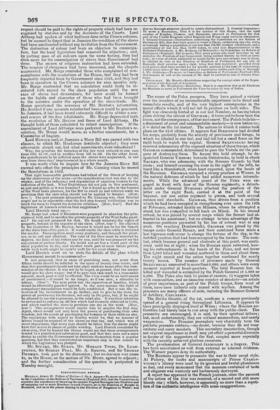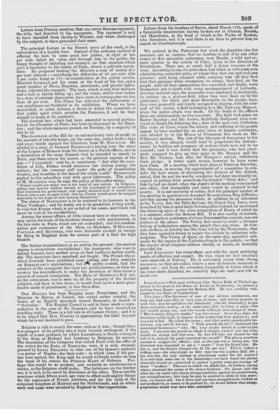The cause of the Poles prospers. They have gained a
victory over the invaders of no inconsiderable importance in its direct and immediate results, and of the very highest consequence in the moral effects which it will not fail to produce on both sides. The fight was obscurely hinted at in our last Number, as having taken place thirine. the retreat of GEISMAR ; it turns out to have been the cause, not dire consequence, of that movement. The Polish bulletin— a document of great and commendable modesty—is now before ti; it is dated on the 1st instant. The actions to which it relates took place on the 31st ultimo. It appears that DIEBITSCH had divided his corps, probably from the scarcity of provisions and forage, to which we alluded in our last, and had left but a small force on the right bank to watch the capital. General SKRZYNECKI having received information of the exposed situation of these troops. which GEISMAR commanded, determined to pass the Vistula for the pur- pose of destroying them. To favour this bold attempt, he de- spatched General Uantesili towards Ostrolenska, to hold in check SACKEN, who was advancing with the Russian Guards by that route ; and himself crossing the river in the night of the 30th, he burst like a thunderbolt, when least expected, upon the heads of the Russians. GEISMAR occupied a strong position at Wawer, to the natural defences of which he had added numerous intrench- ments. While the advanced guard of the Poles were en- gaged in front with four of the Russian regiments, a detach- ment under General RYBINSKI attacked the position of the latter on the right flank, carried it at the point of the bayonet, cut one entire regiment to pieces, and took several cannon and standards. GEISMAR, thus driven from a position which he had been occupied in strengthening ever since the 19th of February. retreated hastily on Milosna, where he attempted a stand, but was compelled to fall back on Minsk. In his second retreat, he was joined by several corps which the former had at- tracted to his assistance; but no attempt to take advantage of the numerous positions presented by his line of retreat was of any avail. On reaching Dembewielki, GEISMAR WRS joined by the troops under General ROSEN, and their combined force made a last vigorous endeavour to change the fortune of the day, in the- fortified position that had been occupied by the former. The com- bat, which became general and obstinate at this point, was conti- nued until ten at night ; when the Russian again retreated, leav- ing his entrenchments in the hands of the Poles, and not fewer than 2,000 killed and wounded scattered in them and about them. The night march and the action together continued for nearly twenty hours. The number of prisoners made by General SKRZYNECKI amounted to more than 6,000, and others were every moment reported at head-quarters. The total Russian loss in killed and wounded is estimated by the Polish General at 5,000 or 6,000. The Poles also took 15 pieces of cannon, 15 waggons laden with ammunition, and an immense number of muskets—an article of great importance, as part of the Polish troops, from want of them, have been hitherto only armed with scythes. Among the prisoners are many officers of rank, including the Russian General of Artillery, CZECZERIN. The Berlin Gazette, of the 1st, confirms a rumour previously spread of a general rising throughout Lithuania. It appears to have principally displayeditself at 'Mina; where the Russian au- thorities had barely time to run away with the public chest. The peasantry are encouraged, it is said, by their spiritual fathers ;- but, most unfortunately, they are without ammunition, and nearly weaponless. The Prussian journalists very charitably term the patriotic peasants robbers,—no doubt, because they do not wear uniform and carry muskets. This secondary insurrection, though not of great importance in itself, may yet effect a powerful diversion in favour of the supporters of the first, coupled more especially with the recently achieved glorious successes.
The proclamation of General JERMOLOFF is a forgery. This has been ascertained as well from external as internal evidence. The Warsaw papers deny its authenticity. The Russians appear to prosecute the war in their usual style. At Pulawy, the books and manuscripts of Prince CZARLO- WINSKY'S library were used by its ignorant and brutal plunderers as fuel, and every monument that the mansion contained of taste and elegance was wantonly and barbarously destroyed.
A report has appeared in the French journals, since the account of the'aetion of the 31st was received, of a second and still more bloody one ; which, however, is apparently no more than a repeti- tion of (lit authentic intelligence with some exaggerations.
Letters from Dantzic mention, that one entire Russian regiment, The '95th, had deserted to the insurgents. The regiment is said to have marched from Grotia to Warsaw, and when challenged by the outpost, to have grounded their arms.



























 Previous page
Previous page